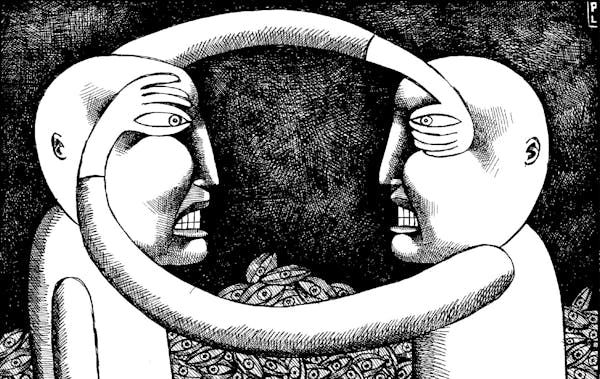Until Friday, 94-year-old Michael Karkoc was only an immigrant living the quiet and peaceful life of a retiree in northeast Minneapolis. He was known as a loving father and grandfather, a longtime member of the Ukrainian immigrant community, a citizen who attended church regularly, always friendly and considerate toward his neighbors.
But soon Karkoc will be subject to the full force of the law, suspected of the worst imaginable of crimes. Karkoc is alleged to have been a top commander of a Nazi SS-led unit accused of burning villages filled with women and children. It seems that the evidence is strong enough for him to face deportation and to be prosecuted for war crimes in Germany or Poland.
How could this man immigrate to the United States after the war and live a normal life in Minnesota for six decades? According to an extensive investigation by the Associated Press, Karkoc fooled the American authorities in 1949, concealing his role as an officer and founding member of the infamous Ukrainian Self Defense Legion.
But that explanation does not suffice. It is too often forgotten that soon after the war the world was not in a mood to remember, and much less to punish. Memory of the Nazi crimes became uncomfortable once the Nuremberg trials were completed. Fighting the new Cold War enemy had become more important to many Western leaders than pursuing the evils of the past. Some authorities did not only close an eye but even facilitated the escape of important Nazis and henchmen.
Reacting to such indifference and political maneuvering, individuals such as Simon Wiesenthal (1908-2005), Elliot Welles (1927-2006), and Serge and Beate Klarsfeld committed their lives to bringing Nazi perpetrators to trial, not allowing the world to forget. Memory for them was closely associated with justice.
Among their best-known targets were Adolf Eichmann, the so-called architect of Hitler's Final Solution (he was tracked down by Wiesenthal before being kidnapped and smuggled from Argentina and tried in Israel); Klaus Barbie, the "Butcher of Lyon" who was identified and extradited from Bolivia to France; and Boleslavs Maikovskis, a Latvian Nazi collaborator, pursued in New York. Despite frequent lack of support and, in fact, resistance, these and other "Nazi hunters" helped bring over thousand former Nazis to trial.
Today, the survivors of the Holocaust are dying out, and so are the mass murderers of World War II. Other atrocities, with new victims, have followed. Perpetrators again are being pursued, today with the help of new institutions such as the International Criminal Court, the first permanent such court with jurisdiction over war crimes, crimes against humanity and genocide.
Can there still be justice, almost 70 years after the events? Yes — without any doubt. Continuing the fight initiated by Wiesenthal and others and relentlessly tracking down and uncovering former Nazi perpetrators sends a strong and vital message. Impunity is not an option. The crimes committed do not fall under any statute of limitation.
Anyone, regardless of his current age and of the time that has passed since the mass murders, must be held accountable and brought to justice. Acting otherwise not only would betray the victims, it would embolden present and even future perpetrators, offering them a carte blanche to commit atrocities. "The only value of nearly five decades of my work," wrote Simon Wiesenthal, "is a warning to the murderers of tomorrow, that they will never rest."
-----------------
Alejandro Baer is director of the Center for Holocaust and Genocide Studies at the University of Minnesota.
Lab-grown beef is red meat for the conservative base


